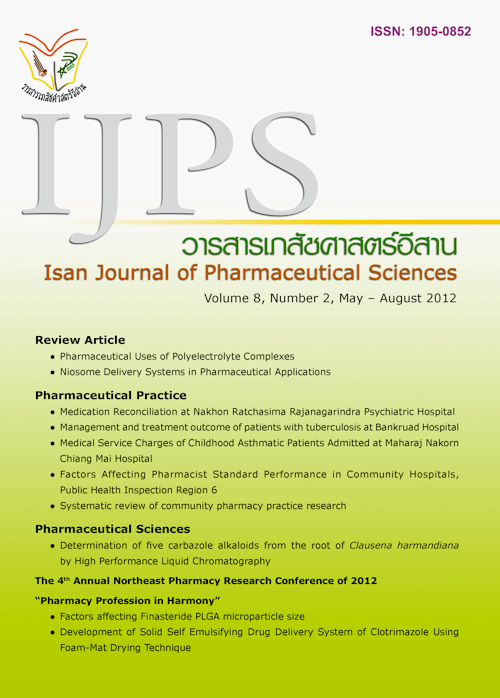Medication Reconciliation at Nakhon Ratchasima Rajanagarindra Psychiatric Hospital
Main Article Content
Abstract
Introduction: Medication errors (MEs) are one of the leading causes of adverse events and usually occur at transitions of care. Communication problems between patients and healthcare professionals are among the causes of MEs.In general, psychiatric patients may have difficulties in communication, which may lead to MEs. Medication reconciliation is a critical process to ensure patient safety. The objectives of this study were to determine 1) frequency and types of MEs 2) factors associated with MEs 3) physicians’ responses to medication reconciliation and 4) amount of time required for medication reconciliation. Materials and Methods: This study was a prospective descriptive study performed at the Nakhon Ratchasima Rajanagarindra Psychiatric Hospital. Medication reconciliation was carried out by a pharmacist at admission and discharge in patients hospitalized during 15 February to 15 April 2010. The pharmacist identified medication discrepancies and evaluated whether they were MEs. Physicians’ responses and time spent during medication reconciliation, which consists of four steps 1) verification of data 2) data clarification 3) identification of medication discrepancy and intervention 4) data transmission, were recorded. Results: In a total of 206 patients, we found 65 MEs in 27 patients (13.1%). There were 36 and 29 errors found at admission and discharge, respectively. The most common errors were omission errors (49 errors, 75.3%), following by incorrect dose and incorrect time (5 errors of each, 7.7%). Factors that independently increased the risk of medication errors were 1) having co-morbidity 2) the number of medications prior to admission and discharge and the number of home medications. After pharmacist intervention, 62 out of 65 MEs were positively responded by physicians (95.4%) and subsequently solved. Pharmacists spent a mean time of 13.7±2.7 minutes per patient to gather patients’ background histories. The average times to review and create a medication list at admissionand discharge were 5.0±1.2 and 5.0±1.3 minutes per patient, respectively. The average times to assess medication errors at admission and discharge were 5.5±2.4 and 4.4±1.4 minutes per patient, respectively. The average times for intervention and checking for physician’s responses at admission and discharge were 7.3±1.7 and 7.0±2.2 minutes per patient, respectively. Conclusions: Although medication reconciliation required more pharmacist’s time, it likely prevented MEs at transitions of care. We suggest that closer attention should pay to high-risk patients who have co-morbidity and been on several medications to ensure patient safety.
Article Details
In the case that some parts are used by others The author must Confirm that obtaining permission to use some of the original authors. And must attach evidence That the permission has been included
References
Bandhukul A. Knowledge of chronic disease [online]. 2010 Feb [cited2010 Sep 10]; [50 screens]. Available from: http://www.npc-se.co.th/pdf/book_safety/BookChronicDiseases.pdf
Bate DW, Spell N, Cullen DJ, et al. Incidence of adverse drug events and potential adverse drug events: implication for prevention. JAMA1995; 274: 24-34.
Cornish PL, Knowles SR, Marchesano R, et al.Unintended medication discrepancies at the time of hospital admission. Arch Intern Med 2005; 165: 424-9.
Gleason KM, Groszek JM, Sullivan C, et al. Reconciliation of discrepancies in medication histories and admission orders of newly hospitalized patients. Am J Health-Syst Pharm 2004; 61: 1689-95.
Gleason KM, McDaniel MR, Feinglass J, et al.Results of the Medications At Transitions and Clinical Handoffs(MATCH) Study: An Analysis of Medication Reconciliation Errors and Risk Factors at Hospital Admission. J Gen Intern Med 2010; 25(5): 441-7.
Insitute for health care improvement. Medication safety reconciliation tool kit [online]. 2006 May [cite 2010 Jul 18]. Available from: http://www.ihi.org/IHI/Topics/PatientSafety/MedicationSystems/Tools/MedicationSafetyReconciliationToolKit.htm
Liang BA, Alper E, Hickner J, et al. The physician’s role in medication reconciliation: issues, strategies, and safety principles. AMA 2007; 1-28.
Lizer MH, Brackbill ML. Medication history reconciliation by pharmacists in an inpatient behavioural health unit. Am J Health-Syst Pharm 2007; 64: 1087-91.
National Coordinating Council for Medication Error Reporting and Prevention. Medication Error Definition [online] 1998 [cited 2010 August 14] Available from, http://www.nccmerp.org/aboutMedErrors.html.
Nester TM, Hale LS. Effectiveness of a pharmacists-acquired medication history in promoting patient safety.Am J Health-Syst Pharm2002; 59: 2221-5.
Ningsanon T. Part I: Medication reconciliation. In: Ningsanon T, Montakantikul P, Chu-lawatanaton S, editors. Medication reconciliation. 2nd ed. Bangkok: Public company limited; 2008. 1-25.
Pippins JR, Gandhi TK, Hamann C, et al.Classifying and Predicting Errors of Inpatient Medication Reconciliation.J Gen Intern Med 2008; 23(9): 1414-22.
Reeder TA, Mutnick A. Pharmacist- versus physi-cian-obtained medication histories. Am J Health-Syst Pharm 2008; 65: 857-60.
Rozich J, Resar R. Medication safety: One organizations approach to the challenge. J Clin Outcomes Manage 2001; 8: 27-34.
Strunk LB, Matson AW, Steinke D. Impact of a pharmacist on medication reconciliation on patient admission to a veterans affairs medical centre. Hosp Pharm 2008; 43: 643-9.
Sue-tong C. Developing and implementing medication reconciliation process following transition points in inpatient medication system [master thesis in pharmaceutical science]. Graduate school: Chulalongkorn University; 2005.
Tatro DS. Drug interaction facts TM the authority on drug interactions 2009. St. Louis: Wolters Kluwer Health; 2009. 1524.
The Joint Commission on Accreditation of Healthcare Organizations. Using medication reconciliation to prevent errors: in sentinel event alert [online]. 2008 Apr [cite 2010 Jul 20]. Available from: http://www.jointcommission.org/sentinelevents/sentineleventalert/sea_39.htm
The Healthcare Accreditation Institute (Public Organization) of Thailand. Hospital standards and health services commemoration of the 60th anniversary celebrations [online] 2007 [cited 2010 August 18]. Available from http://www.wrwhos.org/wordpress/data/HA60yr53.pdf.
The healthcare accreditation institute (Public organization). SPA II-6 medication management.[online]2009 Dec [cite 2010 Sep 10]; [26 screens]. Available from: http://medinfo.psu.ac.th/nurse/m_kmnurse_kmstandards/SPA%20Part%20II%20Ch%206%20Medi-cation%20Management%20Sy.pdf
Vira T, Colquhoun M, Etchells E. Reconciliation differences: correcting medication errors at hospital admission and discharge.Qual Saf Health Care2006; 15: 122-6.


